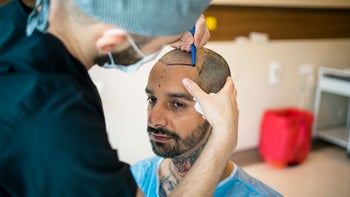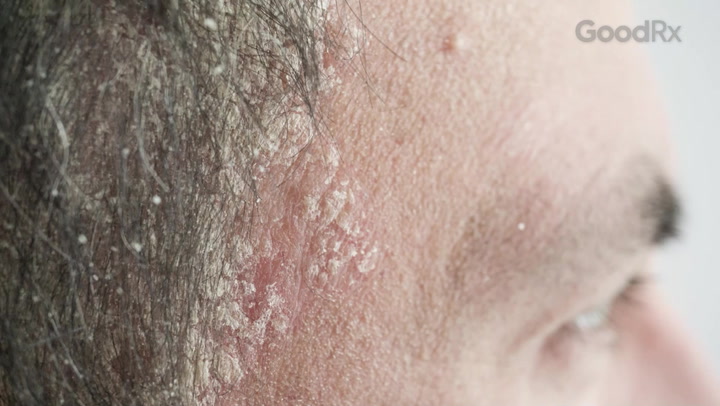
Does Stress Really Cause Gray Hair?
Key takeaways:
There is some evidence that stress can cause hair to turn gray or white prematurely.
Other things that cause gray hair include aging, vitamin deficiencies, and certain medical conditions.
You’re more likely to develop gray hair at a younger age if your family members went gray prematurely.

If you were an unruly child, you may have heard your parents say that you were “giving them gray hair.” You may have even heard stories about people’s hair turning white after experiencing a great shock.
Throughout history, there are stories of people’s hair turning prematurely gray from shock or stress. But can stress really make someone’s hair turn gray? Here’s what the science says about stress and gray hair.
Does stress make hair turn gray?
Maybe. The relationship between stress and gray hair isn’t completely clear. But there is evidence that high levels of stress can make hair turn gray or white.
One of the most-quoted research studies in this area showed that mice that experienced stress lost their fur pigment and went prematurely gray. Researchers exposed the mice to different types of stress, including mild pain and different forms of psychological stress. All types of stress caused the mice to develop gray hair.
Scientists say this is due to the sympathetic nervous system. That’s the part of the body responsible for the “flight or fight response.” When the mice were stressed, their sympathetic nervous systems released a stress hormone called noradrenaline. Noradrenaline made pigment-producing cells (melanocytes) in the hair follicles die faster than usual. This caused the mice to go gray.
It’s important to point out that this study was done with mice, not humans. But a study like this couldn’t be done with humans. So, this mouse model may be the strongest research linking stress and gray hair.
Read more like this
Explore these related articles, suggested for readers like you.
Other studies show that people with higher levels of reported stress are more likely to have gray hair. And research also shows that stress can speed up your body’s natural aging processes, including changes in hair color. These studies don’t show a direct cause-and-effect relationship. But they further support the link between stress and gray hair.
What are the effects of stress on the body?
Gray hair isn’t the only way stress impacts your health. Stress affects the mind and body in several different ways.
Chronic stress can lead to physical changes in the brain. This can impact memory, learning, and judgment.
Stress can weaken the immune system. This can increase your chance of getting sick. There’s also research looking at whether severe stress can lead to cancer.
High levels of stress can lead to cardiovascular disease. This can increase the risk of heart attack and stroke.
Stress can affect your gut, too. This can lead to symptoms like pain and digestive problems.
What else might cause gray hair?
Aging is the most common cause of gray hair. According to the 50-50-50 rule, 50% of people have about 50% gray hair at 50 years old. People with more melanocytes — the cells that make pigment — tend to “go gray” later in life than people with less melanocytes.
Graying may also be genetic. You’re more likely to go gray early if your family members also went gray prematurely. There’s some evidence that paternal genes — from the male side — influence when you go gray more than maternal genes (from the female side). So, if people on the male side side of the family had gray or white hair early, it’s more likely that you will go gray, too.
Some other things that can lead to premature graying include:
Vitamin deficiencies, especially low calcium, iron, and B vitamins
UV light exposure
Smoking
Can you stop gray hair from growing?
Not really. But that might change over time.
Researchers are studying therapies to stop graying, including:
Hormone therapy: Stress hormones may cause gray hair. But other hormones can prompt hair follicles to make more melanocytes. Therapies that can increase these hormones may be able to stop or even reverse graying.
Radiation: There’s some evidence that exposing white hair to radiation can trigger it to make melanin again, allowing hair to regain color.
Slowing white hair growth: White hair grows faster and thicker than colored hair. Researchers are looking at whether slowing down white hair growth can help people go gray more slowly.
If you think stress is contributing to your gray hair, you can try techniques to manage your stress. One study showed that people regained some hair pigment when their stress levels were lowered. This effect only lasted for a short time. But managing stress has many other health benefits, too. You can try:
Building a support network
Working with a therapist
Practicing meditation
Improving your sleep hygiene
Getting more exercise and spending more time outdoors
The bottom line
There’s growing evidence that stress can cause gray hair. Stress can lead to premature graying. You’re more likely to go gray prematurely if your family members went gray early, too. Some medical conditions and vitamin deficiencies also lead to premature graying. Right now, there’s no way to stop or reverse gray hair, but researchers are investigating treatment options.
Why trust our experts?


References
Anggraini, D. R., et al. (2019). Risk factors associated with premature hair greying of young adult. Open Access Macedonian Journal of Medical Sciences.
Epel, E. S., et al. (2004). Accelerated telomere shortening in response to life stress. Proceedings of the National Academy of Sciences.
Jo, S. K., et al. (2018). Three streams for the mechanism of hair graying. Annals of Dermatology.
Mahendiratta, S., et al. (2020). Premature graying of hair: Risk factors, co-morbid conditions, pharmacotherapy and reversal-A systematic review and meta-analysis. Dermatologic Therapy.
NIH Research Matters. (2020). How stress causes gray hair. National Institutes of Health.
Peters, E. M. J., et al. (2017). Hair and stress: A pilot study of hair and cytokine balance alteration in healthy young women under major exam stress. PLoS ONE.
Rosenberg, A. M., et al. (2021). Quantitative mapping of human hair greying and reversal in relation to life stress. eLife.
Sharma, N., et al. (2018). Association of epidemiological and biochemical factors with premature graying of hair: A case-control study. International Journal of Trichology.
Skellett, A., et al. (2008). Sudden whitening of the hair: An historical fiction? Journal of the Royal Society of Medicine.
Yaribeygi, H., et al. (2017). The impact of stress on body function: A review. EXCLI Journal.
Zhang, B., et al. (2020). Hyperactivation of sympathetic nerves drives depletion of melanocyte stem cells. Nature.



















